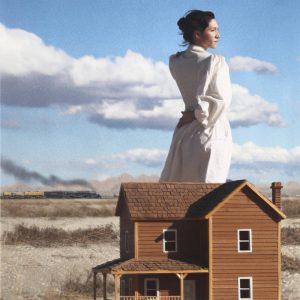
Living in Los Angeles can take a lot out of a person. For Eve Adams the city had begun to take a toll. She longed for the open spaces, and the high desert offered the serenity she lacked. As a result, American Dust reveals a very different woman. The stark landscape gives way to a world filtered through visions filled and unfulfilled, where dreams come to life amidst a very different rhythm.
The changes of life are obvious in ‘Nowhere Now’, documenting her move from the from the sound and fury of city life to the wide-open spaces. “Washed the ashes and dust of Los Angeles/ Now she’s clean and unafraid,” Adams reveals as she looks out a landscape that suits her need for something more simple and solitary. Strings blend with her guitar, forming a haunting bond. The music rears at the soul revealing untold depths. When she adds, “Stop saying I’m pretty/ It makes me feel so mundane,” it becomes obvious that this is a woman who had to leave just to start feeling again.
The wind that blows through the opening of ‘Dirty Thirties’ is filled with dust bowl memories. Strings scatter the dust, while the bass imposes it’s will, filling the track with a sense of darkness and desperation. Fusing the track with the hopelessness of the time, as Adams sings one starts to realise that she is vocalising the shattered hopes and dreams of a generation in the same way that Dorthea Lange did in her black and white photograph Migrant Mother which became a symbol of 1930s desperation.
“There’s something about that daylight/ I couldn’t tell the time/ Is it half past school bells or quarter to windchimes?” The guitar bounces along with the bass, revealing the quandary of not being certain where she is in this new location. She is trying to make sense of a new world far from where she has been and so different that her previous locale.
There’s a sense of dust in these tracks, despite the strings of Gamaliel Traynor’s cello and the violin of Oliver Hamilton. Anchored by multi-instrumentalist and producer Bryce Cloghesy, Adams finds a way to imbue her songs with an air of isolation, along with a dose of desperation that can crack away at the soul of residents of the barren wilderness, even as she’s outlining the destruction inherent in her murder ballad, ‘Ricochet’.
What Eve Adams left behind in LA was replaced by a land of new possibilities. The desert winds bringing with it new mysteries and magic reflecting the landscape and the endless sky. Open to the sights and sounds, Adams finds new sounds and sensibilities on American Dust, examining the rhythms of the locale she now calls home.
